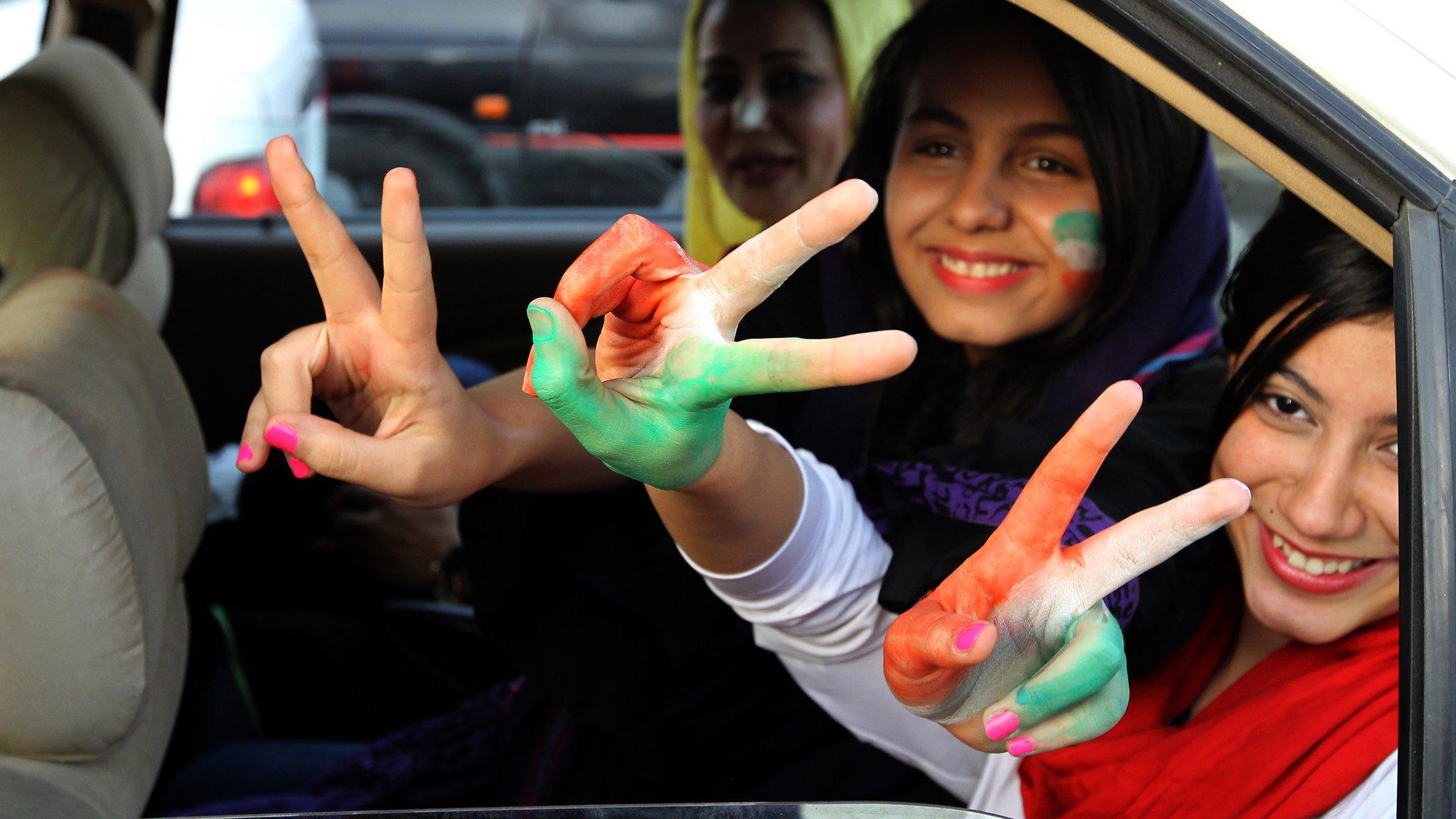Is Iran easing its ban on female sports spectators?
- Published
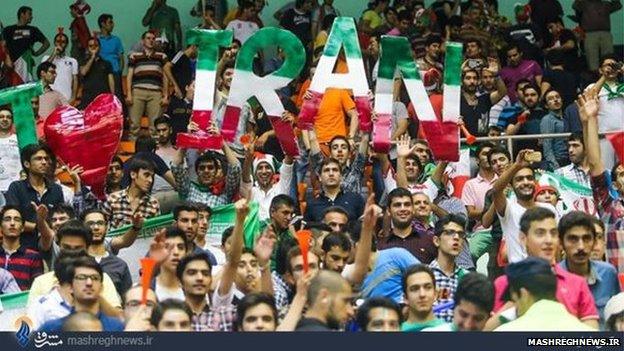
Women have been largely banned from men's sporting events in Iran since 1979
A hotly anticipated men's volleyball match between Iran and the US in Tehran on Friday could be a key test for an easing of a ban on female spectators, but hardliners are resisting any change.
The rival teams will face off at the Azadi (Freedom) Sports Complex, which can accommodate up to 12,000 spectators, all of whom on a normal day will be men.
It is the same story in the adjacent Azadi Stadium, Iran's biggest football venue.
The stadium attracts crowds of over 80,000 but its doors have been firmly closed to women since the Islamic revolution more than 36 years ago.
Iranian women are also banned from watching men's wrestling and swimming.
Sensitivities towards female spectators also extend to television broadcasts of Iranian away matches. State television always shows them with a delay so it can cut out shots of female spectators.
Typically a recorded sequence of male spectators is shown instead of the actual feed from the host country's broadcaster.
'Danger of mixing'
The reasons for these restrictions lie in the strict codes of behaviour enforced in Iran since the 1979 revolution.
Because some sports involve players in outfits that expose lots of flesh, some people consider it inappropriate for women to be watching, says Hassan Fereshtian, an Iranian cleric based in Paris.
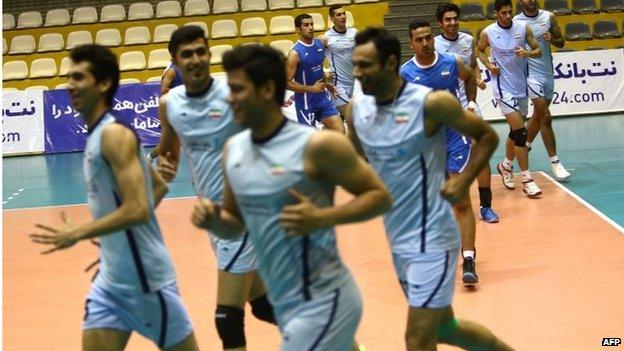
Hardliners say some men's sports outfits are too revealing for women
"Another reason may be the danger of men and women mixing, especially during the post-match celebrations," he says.
This is exactly what happened at a volleyball match in 2013.
Until then volleyball had been a marginal sport and women were allowed in because matches were not popular enough to attract the attention of religious conservatives.
However, as the national team began to make a mark on the international scene it drew growing numbers of fans at home.
"Two years ago there was a match in the Azadi Sports Complex that was packed to the rafters," says Mehdi Rostampour, an Iranian sports journalist based in Copenhagen.
"Half the spectators were women, and although they sat in specially designated areas, chanting quickly developed into a rally back and forth between the male and female sections, with the men completing the women's chants and vice-versa. At that point I knew it was not going to be tolerated."
After this volleyball was ruled strictly off-limits for female fans.
Hopes raised
In June 2014 things came to a head when Iran played Italy at the Azadi Sports Complex.
A group of young female protesters who gathered outside the ground were swiftly arrested.
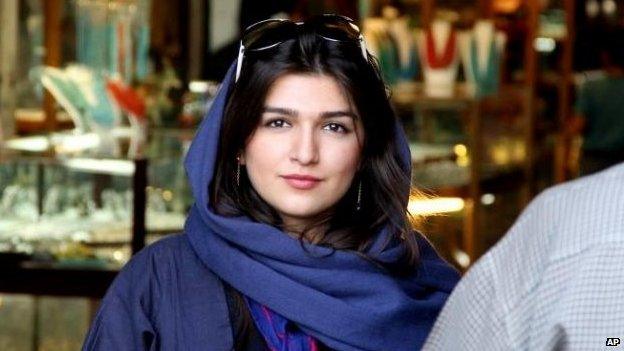
Ghoncheh Ghavami's case last year drew worldwide attention
The case made international headlines when one of them, British-Iranian Ghoncheh Ghavami, was held in jail for the next five months.
The Iranian authorities maintain Ms Ghavami was spreading anti-regime propaganda and that her case had nothing to do with watching volleyball.
However, the publicity prompted the International Volleyball Federation to call for Iran to open up all games to women or lose the right to host international tournaments.
The federation confirmed to BBC Persian that this year's international matches would not be affected as they had already been agreed.
But last week female fans' hopes were raised when Iran's vice-president for Women and Family Affairs, Shahindokht Molaverdi, announced that a limited number of women - mainly from the families of the players - would be allowed into upcoming volleyball matches.
Ms Molaverdi also indicated that women spectators would be allowed into other similar sports too, and in fact in Tehran some female fans did get in to watch a basketball game.
'Presence of prostitutes'
But Ms Molaverdi's comments prompted fury from conservatives who strongly resist any attempts by President Hassan Rouhani's moderate government to loosen social restrictions in Iran.
The religious vigilante group Ansar-e Hezbollah issued a rallying call to its supporters to come to the Azadi Sports Complex to stop women entering.

Ansar-e Hezbollah flyer warning of blood if women try to attend the volleyball match
"We are taking a stand against legalising the presence of prostitutes… in stadiums," the group said in a flyer distributed in Tehran. "This Friday there will be blood."
A number of senior clerics and officials have also denounced the move.
"We didn't rise up in an Islamic Revolution for the right of women to enter sports stadiums," said Ayatollah Mohammad Ali Alavi Gorgani.
And Interior Minister Abdolreza Rahmani Fazli told local media that there had been no change to the current rules banning women from sports stadiums.
Female fans who have tried to buy tickets for the two matches this week have contacted BBC Persian to say they have been unable to do so.
Observers say it is still possible that a select few women could be quietly ushered into the match on Friday, and that other female fans might protest outside. But the situation in general looks unlikely to change any time soon.
"One of the main problems is that there are no written rules," says sports commentator Mehdi Rostampour.
"So the authorities can ban women from any sports event whenever they wish."
- Published23 November 2014
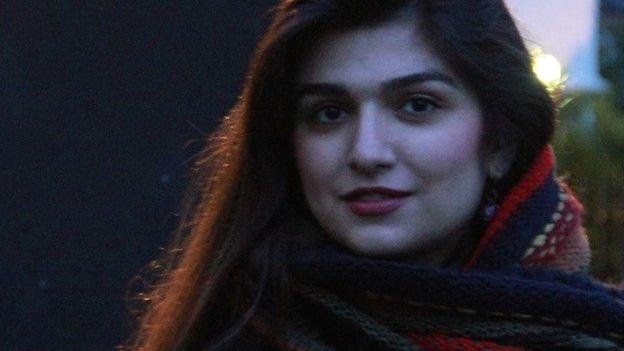
- Published3 November 2014

- Published2 November 2014

- Published13 September 2014

- Published14 July 2014
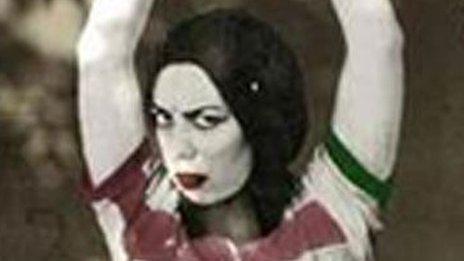
- Published8 November 2013
